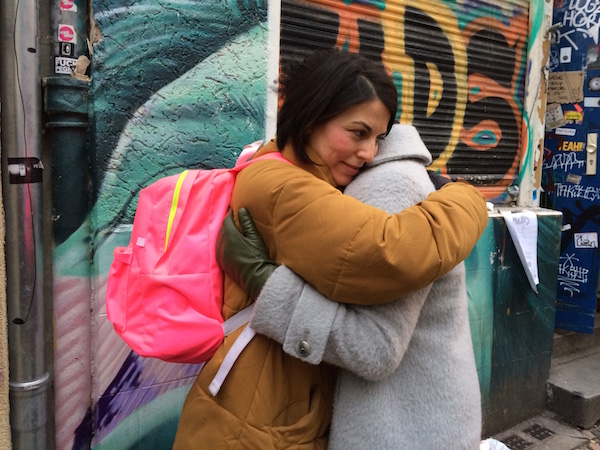
For the Italian version, please, scroll down
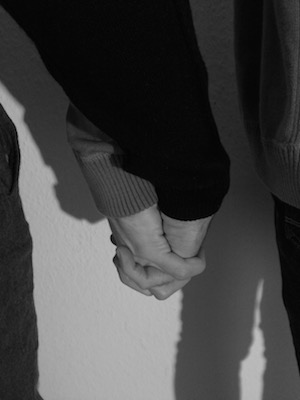
Friendship and love in Berlin
When I moved to Berlin, I already “come out” some time prior. I had had three important relationships, which marked me deeply. Intense stories, beautiful, dramatic, difficult, the last one lasted about five years. I had worked hard to undermine prejudices and influences inculcated in me by a Catholic, puritanical, and well-to-do society, but even so, I was a very different person from who I am now. I pronounced the word „homosexual“ lowering my voice, as if it might offend someone. I had difficulty living sex freely, as if it was a mistake, a sin. Without realizing it, I judged too harshly every choice of mine that endorsed pleasure, so much so that I could not fully enjoy the freedom that I had.
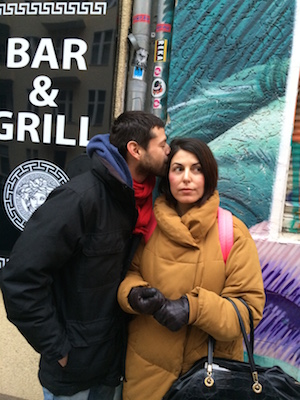
Friendship and love in Berlin
Only when I walked away from Italy did I let down my defenses and put a bit of lightness in my life.
Sure, I contemplated the possibility of homosexual love, I had no complaints about the difference in age between a couple, I was aware that betrayal could have many different meanings and interpretations, but otherwise, my relationship with sex and my ideas about relationships were a bit naive and perhaps not even very open.
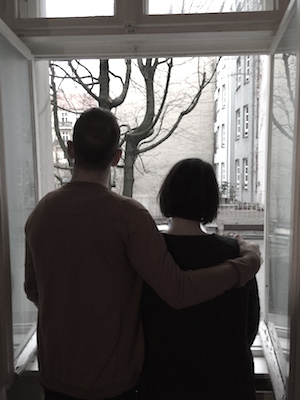
Friendship and love in Berlin
I knew about the impatience and the torments of human nature because I had lived my homosexuality a bit like an ordeal, but I was too taken by my via crucis (The Way of the Cross) to consider problems that I was not living in person or, empathetically, those which my close friends recounted to me. Literature and travel helped me to keep the fertile soil of my thoughts and my ideas, but behind the mask of “I refrain from judging but I would not do it myself“, I hid all the cracks of my supposed modernity and perhaps even my fears.
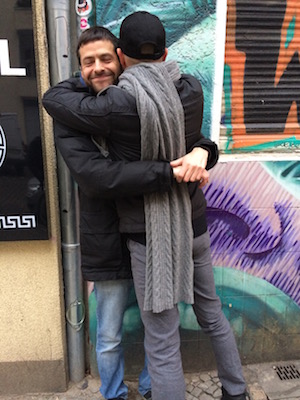
Friendship and love in Berlin
I do not know what it is was dependent on, whehter there are the experiences I have have in recent years here in Berlin, or the fact that in Germany the conditioning of the Church does not exist in the same way, but for some time now, my ideas about sex and relationships have changed.
The dynamics of a couple
In a post hoc analysis, I can say that the first obstacle to a deeper, and perhaps honest understanding of the dynamics of a couple was the fact that I had always thought that a homosexual relationship was no different to a heterosexual relationship.
Of course, if we want to be politically correct, we should say that there are no differences, but is it really so? I do not think so…
First of all, there is strong social conditioning and even reasons of economic opportunism that determine or influence the choices a couple make.
If you reach a certain age without getting married, although it’s no longer a real problem today, it continues to be an unpopular choice and, as far as we feel free from this kind of mentality, it is difficult to be totally indifferent to certain cultural legacies or genuine concern of friends and relatives.
There are even those who get married in order not to accept that a relationship is over. It comes from the illusion that marriage can provide new stimuli and return a little of the lost enthusiasm to the couple’s life together. So instead of letting go and dealing with the pain and with change, people bind themselves even more tightly.
Once married, the relationship – even from a legal point of view – is not just between two people, but also involves relatives, creating new bonds that even further compress the freedom of the couple and their individuality.
The same „pressures“ are valid when it comes to having children, which is added further to a woman reaching a certain age, her fertility and the reality of time passing. Moreover there is the added dependence that can arise from the weaker half of the couple becomes economically dependent on the other one.
Now, I know that my dearest friends – beautiful and intelligent women – at this point will be wrinkling their noses, but only in an ideal society can you argue that these are legacies of the past or „problems“ associated with class and draw social circles. The truth is that these constraints are common to all, albeit to varying degrees. This is confirmed by a certain type of filmography and fiction, the gossip column and the crime beat, as well as testimonies of people near and far.
It is evident, therefore, that a relationship between a man and a woman is woven on several levels and that any decision end up not only targeting members of the couple, but also children and relatives.
It is for this reason that, from my point of view, a homosexual couple should definitely not try take on roles in their relationship with dynamics that exist for other reasons, or reasons that are associated with being in a heterosexual couple. Two gays should base their decisions only on mutual interests, with the obvious advantage of not needing to add any unnecessary pressure, if it doesn’t relate to their specific insecurities and, for some, the fear of loneliness.
Everyone can decide their own rules for ‚happiness‘
Living in Berlin has certainly marked a turning point in my life and in my way of seeing some things.
In a city that is so large and multicultural – where you don’t give any importance to appearances, where there is no interference (even political) from the Vatican and from the Catholic Church to pollute people’s minds with misinformation and guilt, where a lot of foreigners live (to the extent that the physiognomy of the city has changed) – in part it shakes off that a bit provincial patina which, despite our efforts to get rid of it, still echoes in our thoughts.
Moreover, personally and also after collecting my closest friends’ testimonials, or from people I have met here over the years, I realized that when it comes to relationships, everyone can decide their own rules for ‚happiness‘.
Some have an open relationship and don’t want to know anything about their companion’s adventure, there are those who prefer to even share lovers, who are related to the two people but they have an ‚exclusive relationship‘ with both, there are those who cohabitate and who, in order to be able to make the relationship work, prefer to live in different homes, there are those who spend all their time together, and those who prefer to keep their space.
I do not think there’s anything that works for everyone, and I do not believe that a solution is right or wrong. We are all different and each of us must find our own way of feeling good in pairs. The only rule that should apply, is respect for oneself and for others. By respect I mean reciprocal honesty and not sexual fidelity. If two adults are happy in a way that we do not understand, it does not mean that it’s wrong.
Even today there are experiences that I have not tried, things I don’t think I want to experiment with and other situations where, for now, I don’t see myself, but I no longer feel the need to say „I refrain from judging, but I would not do it myself“ in order to distance myself or to absolve myself from the possibility that others might think I would do it. I learned to see situations differently, stripping them of those moral definitions and judgments of (dis)value that I was so used to whilst living in a society of ‚respectable‘ people.
Italian version
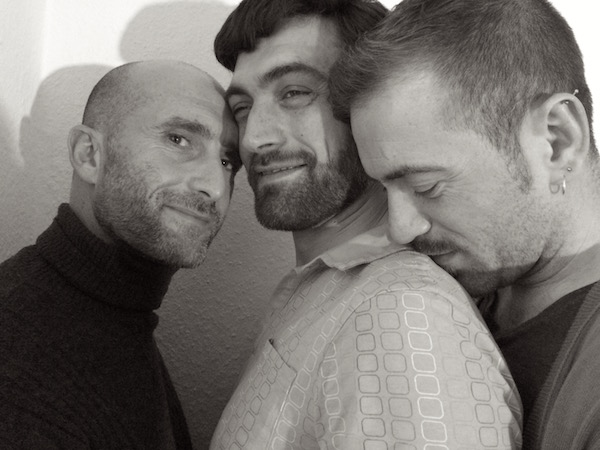

Friendship and love in Berlin
Quando mi sono trasferito a Berlino, avevo fatto già da molto tempo coming out. Avevo alle spalle tre relazioni importanti che mi avevano segnato profondamente. Storie intense, bellissime, drammatiche, difficili, l’ultima durata circa cinque anni. Avevo lavorato duramente per scardinare in me pregiudizi e condizionamenti inculcati da una società cattolica, puritana e ben pensante, ma nonostante ciò, ero una persona molto diversa da quella che sono ora. Pronunciavo la parola “omosessuale” abbassando la voce per strada, come se potesse offendere qualcuno. Avevo difficoltà a vivere il sesso liberamente, quasi fosse un errore, una colpa. Senza rendermene conto, giudicavo troppo severamente ogni mia scelta che privilegiasse il piacere, tanto da non riuscire a godere completamente delle libertà che mi prendevo.
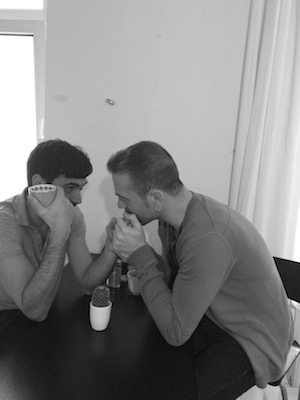
Friendship and love in Berlin
Solo quando mi allontanavo dall’Italia, si abbassavano le mie difese e riuscivo a mettere un po’ di leggerezza nella mia vita.
Certo, contemplavo la possibilità di un amore omosessuale, non avevo da ridire sulla differenza d’età in una coppia, ero consapevole che il tradimento potesse avere molti significati e diverse interpretazioni, ma per il resto, il mio rapporto col sesso e la mia idea di relazione erano un po’ ingenui e forse neanche così tanto aperti.

Friendship and love in Berlin
Conoscevo l’insofferenza e i tormenti della natura umana perché avevo vissuto la mia omosessualità un po’ come un calvario, ma ero troppo preso dalla mia via crucis per pormi problemi che non fossero quelli che stavo vivendo personalmente o, per empatia, quelli che mi raccontavano gli amici più cari. I libri e i viaggi mi aiutavano a mantenere fertile il terreno dei miei pensieri e delle mie idee, ma dietro la maschera del “mi astengo dal giudicare ma io non lo farei”, si nascondevano tutte le crepe della mia presunta modernità e forse anche le mie paure.
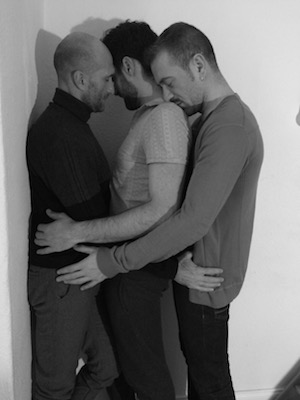
Friendship and love in Berlin
Non so da che cosa sia dipeso, se siano state le esperienze fatte negli ultimi anni qui a Berlino, o il fatto che in Germania non ci sia il condizionamento della chiesa, ma da tempo, oramai, le mie idee in fatto di sesso e di relazioni sono molto cambiate.
Dinamiche di coppia
In un’analisi a posteriori, posso dire che il primo ostacolo verso una più profonda, e forse onesta, comprensione delle dinamiche di coppia, era quello di aver sempre pensato che un rapporto omosessuale non fosse in nulla diverso da una relazione eterosessuale.
Certo, volendo essere politicamente corretti bisognerebbe dire che non ci sono differenze, ma è realmente così? Io non credo…
Prima di tutto ci sono fortissimi condizionamenti sociali e anche ragioni di opportunismo economico che determinano o influenzano le scelte di una coppia.
Raggiungere una certa età senza essersi sposati, sebbene non costituisca più un vero problema, continua a essere una scelta impopolare e, per quanto ci si senta affrancati da questo tipo di mentalità, è difficile essere del tutto indifferenti a certi retaggi culturali o alla sincera preoccupazione di amici e parenti.
C’è persino chi ci si sposa pur di non accettare che una storia sia finita. Nell’illusione che il matrimonio possa fornire nuovi stimoli e restituire un po’ di perduto entusiasmo nella vita di coppia. Così, invece di lasciarsi e confrontarsi con il dolore e con il cambiamento, ci si lega ancor di più.
Una volta sposati, il rapporto – anche da un punto di vista giuridico –, non è più solo di due persone, ma coinvolge anche i parenti, creando nuovi vincoli che comprimono sempre più la libertà degli sposi e la loro individualità.
Le stesse “pressioni” valgono per il discorso figli, al quale si aggiunge l’ulteriore condizionamento dell’età della donna, della sua fertilità e del tempo che passa.
Per non considerare la soggezione cui è sottoposta la parte più debole della coppia nei casi in cui esista anche una dipendenza economica di un coniuge all’altro.
Ora, so bene che le mie più care amiche – donne belle e intelligenti – in questo momento staranno storcendo il naso, ma solo in una società ideale si potrebbe affermare che questi siano retaggi del passato oppure “problemi” legati al ceto e all’estrazione sociale. La verità è che questi condizionamenti sono comuni a tutti, sia pure in misura diversa. Lo confermano un certo tipo di filmografia e di narrativa, la cronaca rosa e quella nera, e anche le testimonianze di persone vicine o lontane.
È evidente, dunque, che un rapporto tra un uomo e una donna sia intrecciato su più piani e che qualsiasi decisione finisca col riguardare non solo i componenti della coppia, ma anche figli e parenti.
È per questo motivo che, dal mio punto di vista, una coppia omosessuale non dovrebbe assolutamente cercare di riprodurre un rapporto con alcune dinamiche che trovano altre motivazioni e altre ragioni d’essere in una coppia eterosessuale. Due gay dovrebbero fondare le proprie scelte soltanto sugli interessi reciproci, con l’evidente vantaggio di non subire pressioni, se non quelle legate alle proprie insicurezze e, per qualcuno, alla paura della solitudine.
Ognuno può decidere le proprie regole per essere ‘felice’
Vivere a Berlino ha senz’altro segnato una svolta nella mia vita e nel mio modo di vedere alcune cose.
In una città così grande e multiculturale – in cui si dà molta poca importanza alle apparenze, dove non ci sono le ingerenze (anche politiche) del Vaticano e della chiesa cattolica a inquinare il pensiero della gente con mistificazioni e sensi di colpa, in cui vive una quantità di stranieri tale da aver cambiato persino la fisionomia della città – in parte ci si scrolla di dosso quella patina un po’ provinciale che, malgrado gli sforzi compiuti per liberarcene, fa da eco ai nostri pensieri.
Del resto, sia personalmente sia raccogliendo le testimonianze degli amici più stretti o di persone conosciute qui nel corso di questi anni, mi sono reso conto che in fatto di relazioni, ognuno può decidere le proprie regole per essere ‘felice’.
C’è chi ha una relazione aperta e non vuole sapere niente delle avventure del compagno, chi invece preferisce condividere anche gli amanti, chi è legato a due persone ma ha un rapporto ‘esclusivo’ con entrambe, chi convive e chi, per riuscire a far funzionare il rapporto, preferisce abitare in case diverse, c’è chi spende tutto il tempo insieme e chi preferisce mantenere i propri spazi.
Non credo ci sia qualcosa che funzioni per tutti e non credo che una soluzione sia giusta e una sbagliata. Siamo tutti diversi e ognuno deve trovare il suo modo di star bene in coppia. L’unica regola che dovrebbe valere in assoluto, è il rispetto per sé stessi e per gli altri. Rispetto inteso come onestà reciproca e non come fedeltà sessuale. Se due persone adulte sono felici in un modo che non capiamo, non vuol dire sia sbagliato.
Anche oggi ci sono esperienze che non ho provato, cose che non credo di voler sperimentare e altre situazioni in cui, al momento, non mi rivedo, ma non sento più il bisogno di dire “mi astengo dal giudicare, ma io non lo farei” per prendere una distanza o per assolvermi dalla possibilità che gli altri lo pensino. Ho imparato a vedere le situazioni in modo diverso, spogliandole di quei significati intrisi di moralismo e di giudizi di (dis)valore cui ero abituato nella società delle persone ‘perbene’.
